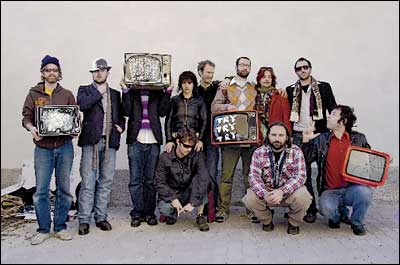
Broken Social Scene is usually described as “a rock collective,” a term that makes me want to gag. I’m all for collaboration, but given that the Ringos of the world outnumber the Pauls and Johns, I much prefer egocentric control freaks. The Canadian band’s U.S. debut, 2003’s You Forgot It in People, seemed to bear this out, buckling under the weight of its good intentions. The melodies were sweet, but the arrangements suffered from too much democracy—a whole bunch of different singers and every instrumentalist under the sun: banjo pickers, violinists, horn blowers, you name it. To my ears, it sounded like a class project.
Others felt different. You Forgot It in People was a critical smash, paving the way for the great musical invasion from the north that’s still going strong today (Wolf Parade and Constantines are worthy of attention). Broken Social Scene was celebrated by critics for its dramatic flair and for high-degree-of-difficulty stunts like slipping a trombone into the mix and making it sound like it belonged. People liked the fact that just about every Canadian band of note was either represented in the collective or was just a degree or two separated. Wasn’t Canada just the coolest? And by the slack standards of indie rock, the album even sold well: about 80,000 copies in the U.S.
My relationship with Broken Social Scene’s new self-titled CD got off to an inauspicious start when I flipped open the case and was greeted by the message “We hate your hate.” Soldiering on, I read the credits and noticed that the “collective” had swelled to seventeen members, an awful lot of cooks for simple fare like rock music, plus four guests, one of whom is the rapper K-OS. Naturally, he’s a “conscious” rapper; they’re the kind who hate your hate.
But as I got around to actually listening to the CD, a couple of songs immediately sunk their hooks into me. “7/4 (Shoreline)” is a deeply effective pop tune: A crisp, skipping drumbeat supports a seductive vocal by Leslie Feist (who happens to have her own flourishing solo career). Then there’s “Ibi Dreams of Pavement (A Better Day),” an homage to those patron saints of indie rock, Pavement; Stephen Malkmus himself hasn’t put out a song this good since “Crooked Rain.” Through the first several bars of shaggy guitar chords and wobbly vocals, it even sounds like it is Pavement. Then the strings and horns kick in for full symphonic effect, and Broken Social Scene is off on its own peculiar and magnificent odyssey.
Before long, I was listening compulsively to the entire album, mesmerized by the band’s gaudy eccentricities, from the groovy falsetto of “Hotel” to the stop-and-start, hand-clapping madness of “Windsurfing Nation” (which is where K-OS makes his mercifully brief cameo). I began to understand the album as a kind of sprawling flea market; a couple of gems in clear view, then a vast pile of odds and ends in which each piece shines a little brighter every time you rummage through the junk.
As a work of unfettered self-indulgence, this one leaves You Forgot It in People thoroughly in the dust. What Broken Social Scene has apparently done is abandon the pretense of even trying to sound like a coherent band. It’s possible to mistake the fourteen tracks here as the work of fourteen separate groups. And yet they are bound by the mad science of producer Dave Newfeld, who treats each song as a mini-epic. Kevin Drew, a founding member of Broken Social Scene, told me in a phone interview that “Newf would never just let us stay on one path. We’d come back into the studio to work and he’d have been up all night working on six different mixes of a song, or having chopped up an extended jam into three different songs. We loved him, we hated him, he drove us completely insane.”
Perhaps, then, Newf is the egocentric control freak that this collective needed. The results are woolly and weird, but never predictable or dutiful. Broken Social Scene has pulled off the rare feat of making a heavily produced record sound instinctive and spontaneous.
The album is capped by a ten-minute opus called “It’s All Gonna Break,” which is described in the liner notes as “Bob Seger on acid.” It starts off, innocently enough, as a twangy alt-country anthem, then goes off the rails. One moment, it soars into a cymbal-crashing crescendo; the next, it drops down into a jazzy crawl, the song collapsing into itself, barely held together by a lazy beat and the heavy breathing of the backup singers. Finally, horns come barreling in like a spastic college marching band doing a halftime show, concluding the album with a series of triumphant, brassy bursts. By the time they’re through, you’re exhausted right along with them, dazed but satisfied.
I think there’s another reason Broken Social Scene sounds better this time around. The context of indie rock has changed. The last two years have seen an explosion of young retro-obsessed bands who name-drop the likes of Joy Division and Gang of Four as their influences but usually sound more like Duran Duran. It’s hard to explain why this is happening, but their lack of musical ambition is a bummer. Give me a collective over that any day.
Broken Social Scene
Broken Social Scene.
Arts & Crafts.